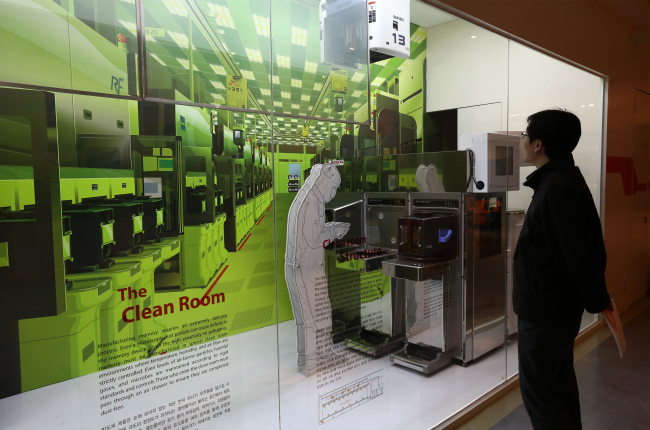SK Hynix, the world’s No. 2 chip supplier, on Wednesday said it has signed a cross-license deal with Rambus to put an end to a decade-long patent infringement lawsuit with the U.S.-based high-speed memory-chip designer.
Under the deal, the local chipmaker will pay up to $240 million to Rambus over the course of the next five years for access its entire category of semiconductor technology, the Seoul-based company said.
It stressed that the deal, which came ahead of an official court ruling in the U.S. that was expected to be partially favorable for SK Hynix, has eliminated all uncertainties surrounding its chip patents in dealing with Rambus.
“In effect, the deal will lead to the withdrawal of several related patent infringement lawsuits,” said James Kim, vice president of the chipmaker’s Investors and Public Relations Group. “Furthermore, the deal has helped us wipe out all legal uncertainties to put SK Hynix back on its path to becoming a world-class semiconductor maker.”
 |
A visitor looks at a display showing the clean room in the showroom of the SK Hynix Semiconductor Inc. plant in Cheongju, North Chungcheong Province. (Bloomberg) |
Kim added that the $240 million of royalty fees, which will be paid out over the next five years, have already been included in the company’s reserve funds, meaning they do not indicate a further financial burden.
“We all knew this was how it would end,” said one SK Hynix executive, declining to be identified. “We may have spent a fortune on legal bills, but for the management, rooting out uncertainties holds a bigger value.”
He also said the signs that Rambus would “bend” had already been there, particularly following a federal court ruling last year that failed to see SK Hynix involved in illegal antitrust actions against the U.S. company.
In May, another U.S. court ordered the Korean chipmaker to pay only a part of the payment it was previously slapped with, but SK Hynix said it was considering an appeal as soon as an official ruling was handed down.
The Korean chipmaker’s confidence was rooted in the fact that Rambus was at the time barred by a U.S. federal court from using at least a dozen of its patents to demand royalties from Micron Technology, industry watchers said.
The court said it reached the decision based on evidence that Rambus had improperly destroyed documents tied to the litigation between the two companies.
Rambus executives were contacted but were unavailable for comment.
The legal battle with Rambus originally began in 2000 in the U.S., and has spawned a number of related lawsuits in Europe, including an antitrust suit raised by Rambus.
Micron Technology and Samsung Electronics were other chipmakers accused by Rambus for colluding to prevent Rambus’ technology from expanding the industry.
Samsung reached an out-of-court settlement in 2010.
By Kim Ji-hyun (
jemmie@heraldcorp.com)







![[Herald Interview] Meet 1VERSE, first K-pop boy band to feature North Korean defectors](http://res.heraldm.com/phpwas/restmb_idxmake.php?idx=644&simg=/content/image/2024/11/27/20241127050102_0.jpg)
